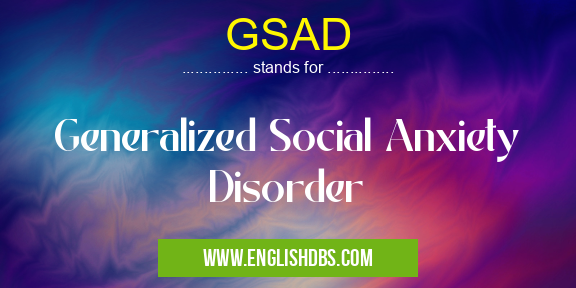What does GSAD mean in UNCLASSIFIED
GSAD stands for Generalized Social Anxiety Disorder, a chronic mental health condition characterized by excessive and persistent fear or anxiety in social situations. Individuals with GSAD may experience significant distress and impairment in their daily lives due to their social anxiety.

GSAD meaning in Unclassified in Miscellaneous
GSAD mostly used in an acronym Unclassified in Category Miscellaneous that means Generalized Social Anxiety Disorder
Shorthand: GSAD,
Full Form: Generalized Social Anxiety Disorder
For more information of "Generalized Social Anxiety Disorder", see the section below.
Symptoms of GSAD
- Intense fear or anxiety in most social situations
- Avoidance of social interactions or activities
- Physical symptoms such as sweating, blushing, shaking, or shortness of breath
- Negative thoughts or beliefs about oneself or others in social situations
- Difficulty making friends or maintaining relationships
- Self-consciousness or feeling judged by others
- Avoidance of public speaking or performing in front of others
- Fear of being embarrassed or humiliated
Causes of GSAD
The exact causes of GSAD are not fully understood but may include a combination of genetic, environmental, and psychological factors. Some potential contributing factors include:
- Family history of anxiety disorders
- Negative past experiences in social situations
- Temperamental traits such as shyness or inhibition
- Cognitive distortions or negative thinking patterns
- Neurobiological factors involving the brain's fear response system
Treatment for GSAD
Treatment for GSAD typically involves a combination of therapy and medication. Cognitive-behavioral therapy (CBT) is often effective in helping individuals with GSAD identify and change negative thinking patterns and behaviors that contribute to their anxiety. Medication such as selective serotonin reuptake inhibitors (SSRIs) or benzodiazepines may also be prescribed to reduce symptoms of anxiety.
Essential Questions and Answers on Generalized Social Anxiety Disorder in "MISCELLANEOUS»UNFILED"
What is Generalized Social Anxiety Disorder (GSAD)?
GSAD is a chronic mental health condition characterized by excessive and persistent fear of social situations where individuals feel scrutinized, judged, or humiliated. These fears can lead to avoidance of social interactions, significant distress, and impairment in various aspects of life.
What are the symptoms of GSAD?
Common symptoms of GSAD include:
- Intense anxiety in social situations, such as meeting new people, speaking in public, or attending social events
- Fear of being judged, embarrassed, or humiliated
- Avoiding social situations altogether or enduring them with significant distress
- Physical symptoms like sweating, blushing, trembling, or nausea
- Difficulty making friends, maintaining relationships, or dating
- Low self-esteem and negative self-image
- Anxiety that is excessive and disproportionate to the actual social threat
What causes GSAD?
The exact cause of GSAD is unknown, but it is believed to be influenced by a combination of factors, including:
- Genetics: Family history of anxiety disorders can increase the risk
- Brain chemistry: Imbalances in certain brain chemicals, such as serotonin, may contribute
- Environmental factors: Traumatic or stressful life events, such as bullying or social rejection, can trigger GSAD
- Personality traits: People with certain personality traits, such as shyness or low self-esteem, may be more vulnerable
How is GSAD treated?
Treatment options for GSAD typically involve a combination of:
- Cognitive-behavioral therapy (CBT): Focuses on identifying and changing negative thought patterns and behaviors
- Exposure therapy: Gradually exposing individuals to feared social situations in a safe and supportive environment
- Medication: Antidepressants, such as selective serotonin reuptake inhibitors (SSRIs), can help manage anxiety symptoms
- Support groups: Connecting with others who have similar experiences can provide support and encouragement
Can GSAD be cured?
While there is no known cure for GSAD, it can be effectively managed with treatment. With appropriate therapy and support, individuals with GSAD can learn coping mechanisms, reduce their anxiety, and improve their overall quality of life.
Final Words: GSAD is a common mental health disorder that can significantly impact an individual's life. However, with appropriate treatment, individuals with GSAD can learn to manage their anxiety and improve their overall well-being. It is important to seek professional help if you are struggling with social anxiety as early diagnosis and treatment can lead to better outcomes.
